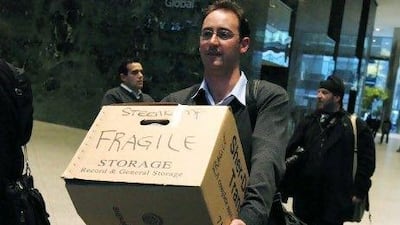The close of 2011 may be the most challenging year-end auditors have ever faced.
Finance:
Industry Insights Exclusives you can bank on from The National's premium content. Learn More
After four consecutive years of the worst financial crisis we have seen since the Second World War, auditors will have to make very difficult judgment calls and these require auditors to adopt a stance of professional scepticism towards their clients, which will reinforce their independence and objectivity.
Recent corporate failures highlight the complex environment auditors face. Despite changes in audit and governance regulations, corporate failures continue to undermine confidence in audits and the audit profession as a whole.
The latest worrying example is Olympus, the Japanese camera maker, which has admitted to hiding large losses related to securities investments for two decades.
The revelation has cast the spotlight on the role of their auditors during that period.
And MF Global, the now bankrupt hedge fund, whose external auditor said as recently as May its controls were fine.
Think about the implosion at Dexia, the giant French-Belgian lender that took a government bailout to avoid collapsing. Dexia got a clean opinion from its auditor last March.
Then there is Austria's Erste Bank, which was wrongly treating credit default swap contracts as financial guarantees.
These all show how complicated the environment has become and the ever increasing demands on high audit quality to protect shareholders.
One area that will test auditors this year will be impairment tests of goodwill.
Where a company has to undertake this test, on an annual basis, management will try to avoid taking an impairment loss by arguing a robust business plan that will make good on an acquisition. The auditor needs to be in doubt and challenge management before trusting their view.
With more risks than ever of further eroding confidence, auditors need to step up their game.
We have come to a point where auditors need to include in their annual audit programme forensic steps to detect fraud and misappropriation. These should especially include steps to scrutinise fair valuation, revenue recognition, off-balance sheet items and impairment tests.
The objective of a forensic audit is different from the objective of a financial statement audit.
In an audit of financial statements, the auditor's overall objective is to express an opinion on whether the financial statements are prepared, in all material respects, in accordance with an applicable financial reporting framework. However, in a forensic audit, the objective is to uncover asset-theft fraud.
Under the existing standards in the UAE, responsibility for preventing and detecting fraud rests with the management. Although the auditor has not been required to perform work with a forensic mind, he or she still can have a positive role in preventing fraud and errors by deterring their occurrence.
The auditor should plan and perform the audit with the recognition that conditions or events may be found that indicate fraud or error may exist. The auditor currently is not responsible for preventing and detecting fraud, which is a clear departure from where the profession started. But whenever an accounting deception is uncovered, one of the first questions investors ask is: "Where were the auditors?"
Recent developments in auditing standards have imposed requirements on all auditors to perform enhanced procedures, which include mandatory meetings of the audit team to discuss the susceptibility of the entity to misstatements and fraud or error that could result from related party relationships. However, recent failures do suggest further action is needed.
I believe the standards should include a positive obligation on auditors to perform audits with a forensic mind to discover frauds over a certain threshold.
These steps will cost more in audit fees, but that will pale in comparison to the cost of undetected fraud.
(Paul Koster is the chief executive of the Dubai Financial Services Authority).

